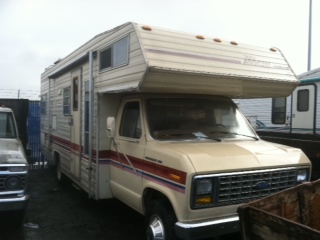Different Types Of RV
The Pros And Cons
There are different types of RV. Here we look at the pros and cons of each.
The secret to finding the best RV for you is to know what’s available and to ask the right questions.
Basically, there are three types of RV: motorhomes, trailers, and pickup truck campers. Motorhomes come in three different types: ClassA, Class B, and Class C. Trailers can also be broken down into three types: Fifth-wheel trailers, Travel Trailers, and Tent Trailers. Tent Trailers are also known as Pop-up trailers.

Class A Motorhomes are easy to recognize. They look a lot like a bus. They are the biggest types of RV, usually between 24 and 45 Ft. They are also the heaviest and most expensive. Prices can range from $90,000 to over $1,000,000. Class A motorhomes are popular with full-timers.
Pros:
· More room for people, pets, and stuff.
· Usually built on a heavy duty chassis or truck chassis.
· Driver sits higher for better view of the road.
· More amenities and luxury
· Larger tanks for more fresh & waste water, propane, and fuel, means longer boondocking time.
· Larger sizes come with diesel engines.
· Can tow more weight.
· More snob appeal.
· Room for residential-size toilet. (yes, it’s a big deal)
Cons:
· More expensive than other RVs.
· Larger size makes them harder to drive in tight spaces or narrow/winding roads.
· Larger size restricts them from many campgrounds.
· Fuel and insurance costs are higher.
· Diesel engines add to the purchase price and are more expensive to fix.
· Snob appeal.
· Too large and impractical to drive around town. Many Class A owners tow a car behind the RV.
Class B Motorhomes are converted vans. They are popular with the minimalist crowd. Although some folks full-time in them, they are best suited for short camping trips. Whereas their small size limits them in living and storage space (“Do we have room for enough margarita mix?”), they have several advantages over bigger RVs.
Pros:
· Relatively cheap to buy (used) and operate.
· Drives like a van.
· Can be parked almost anywhere.
· Practical to drive around town.
· Can be used as a second family car.
· Easier to be stealthy when looking for overnight parking.
· Like Class A and C motorhomes, you can move between the drivers compartment and the living area without having to exit the RV.
· Relatively good gas mileage.
· Can usually be stored at home. No need to pay for expensive RV storage.
· Newer models are quite lush and well equipped.
· You can tow a trailer.
Cons:
· Not much living and storage space (“What do you mean ‘we’re out of margarita mix’?”)
· Older models are very basic. Usually the table and bench seats convert into the bed, can’t use both at the same time. Not the most comfortable…
· Toilet and shower occupy the same space
· Brand new models can cost as much as a Class C that is nearly twice as big.

Class C Motorhomes usually have a van front-end with an enclosed section over the roof of the cab. The section that hangs over the cab is usually a sleeping area, storage space, or a spot for an entertainment center. Class C motorhomes can be very small, less than 20 feet, to very large, over 40 feet. They can be very basic or outfitted with all the comforts found in a Class A.
Pros:
· Usually less expensive to buy than a comparable Class A.
· Easier to drive than a Class A.
· Can tow a vehicle or trailer. You can bring your boat, ATVs, etc.
· Suitable for full-timing.
· Van front-end is safer in crashes than Class As.
· No need to enter living space to work on engine.
· Large range in size and amenities available.
· Can move between cab and living area without having to exit the RV.
Cons:
· Larger sizes harder to drive in tight spaces and narrow roads.
· May not hold resale value as well as a Class A.
· Do not “feel” as heavy duty as Class As
· Less snob appeal.

Fifth-Wheel trailers are basically just travel trailers that have a raised forward section. There is a fifth-wheel hitch, similar to the kind found on eighteen-wheelers, attached to the bottom of the raised forward section.
Pros:
· Larger models are very spacious.
· Very popular with full-timers.
· Easier to tow and back-up than travel trailers.
· The tow vehicle can be unhitched and used as an around town car.
· Lack of drivetrain means less expensive to buy than a motorhome.
· Lots of storage space.
· Some models called “toy haulers” have a built-in garage for motorcycles, ATVs, and other “toys” that would otherwise require a trailer to bring along.
Cons:
· You need a truck equipped with a fifth-wheel hitch.
· Larger trailers will require a dual wheel heavy duty pickup.
· Living space is separate from truck. You have to walk outside to go from one to another. No driving in your PJs or underwear.
· Larger models may require RV storage when not in use.
· In most states you cannot tow behind a trailer. Could be a problem if you want to bring a boat or other toys.
· Toy hauler garage cuts into usable living space.

Travel Trailers come in many different sizes and styles. Small trailers can be pulled by just about any car. Medium-sized trailers will need to be pulled by a full-sized car, SUV, or pickup. Large trailers will require a heavy duty pickup. Whenever towing, make sure your vehicle and tow equipment is rated for the weight you want to tow.
Pros:
· Relatively inexpensive
· When unhitched, tow vehicle can be used as an around town car.
· Unlike fifth-wheel trailers, bed of pickup can be used to store stuff. A rack or shell can be added to the truck…
· Smaller trailers can be towed with a car.
· Smaller trailers can be stored in a driveway or garage.
· Everything is on one floor. No stairs to the sleeping area as in many fifth-wheel trailers.
· Larger trailers are popular with full-timers.
Cons:
· In most states you cannot tow behind a trailer.
· Harder to tow and backup than a fifth-wheel trailer
· Larger units may need RV storage when not in use.
· You have to leave the tow vehicle to enter the trailer.
· Larger trailers will require heavy duty tow vehicle.
Pickup Truck Campers have come a long way. In the early days they were pretty basic and used primarily by folks who liked to hunt and fish. Modern truck campers have many of the same features as other RVs. Some come equipped with AC, showers, toilets, kitchens, and even slideouts. Take a short tour of a truck camper here.
Pros:
· Relatively inexpensive.
· Can be used as an around town vehicle.
· Good for getting to those hard to reach campsites.
· Easy to drive.
· No trailer to tow…unless you want to tow a boat or something.
· Wide variety of styles and sizes available.
· Newer models come with slideouts.
· Camper can be removed so truck can be used as a regular work truck.
· Can fit in driveway.
Cons:
· Limited living and storage space.
· Needs a suitable truck.
· You have to leave the cab and walk outside to enter the camper.
· Overall height will increase—watch your clearance.




